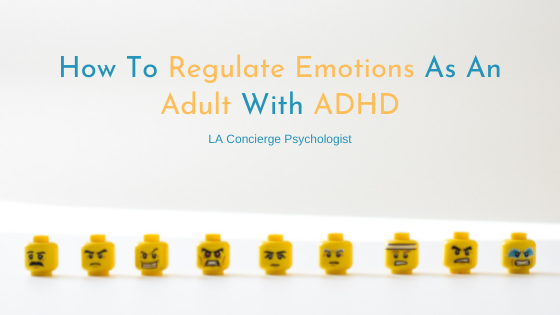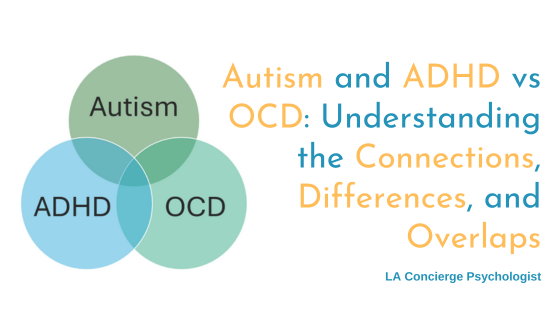Anyone who’s ever heard of attention-deficit hyperactivity disorder knows that people with ADHD struggle to direct and control their attention. What’s not well-known is that ADHD can also cause difficulties in controlling one’s emotions, a condition psychologists refer to as emotional dysregulation.
Clinical studies suggest that as many as 70% of adults with ADHD exhibit emotional dysregulation.[i] More than 50% of ADHD adults have an anxiety disorder, and nearly half are treated for depression at some point in their lives.1 Bouts of sudden, uncontrolled anger are also common with ADHD.
Before we explain how to overcome emotional dysregulation, let’s address the more fundamental question: What does “emotional regulation” actually mean? Emotional regulation allows a person to avoid overreacting to emotional situations. It helps them temper emotional outbursts and respond with more calmness and clarity during stressful situations. Thanks to a person’s emotional regulation abilities, they can modify their emotional state to align more closely with their goals.
Emotional dysregulation, on the other hand, is the inability to align one’s emotions with one’s goals. For example, imagine that an office worker named John is vying for a promotion. If he repeatedly loses his temper during meetings, his boss might be reluctant to give him more responsibility. If John instead uses emotional regulation skills to calm his anger and address his ADHD symptoms, it will be easier to accomplish his goals.
Not surprisingly, emotional dysregulation is associated with a wide variety of functional impairments in adults with ADHD. Research suggests that people who cannot emotionally regulate are more likely to harm others and engage in self-injurious behaviors. They are also more likely to drop out of school, get divorced, commit crimes, cause traffic accidents, and make poor financial decisions.[ii]
What causes emotional dysregulation in adult ADHD?
A very simplified explanation is that the pre-frontal cortex plays a critical role in regulating emotions. Unfortunately, in adults with ADHD, the pre-frontal cortex does not function as it does in neurotypical people. A metaphor often used is that ADHD-ers have a Ferrari brain and bicycle brakes. Meaning, the ADHD brain is easily revved up but struggles with slowing down.
Some symptoms of mood disorders overlap with those of ADHD. For example, people with ADHD and clinical depression both have a hard time initiating tasks. Some researchers believe differences in certain brain regions (including the amygdala and prefrontal cortex) may cause both emotional dysregulation and other symptoms of ADHD.
The consequences of untreated ADHD symptoms can also cause or exacerbate emotional difficulties. For example, an adult with ADHD who has not learned executive functioning skills might sometimes miss deadlines. The potential consequences—from failing a college class to receiving a bad performance review at work—are inherently stressful. They can push someone with ADHD’s anxiety levels beyond their ability to control them. Repeatedly experiencing stressful consequences like these can erode a person’s sense of self-worth and prime them for feelings of frustration and hopelessness.
How to regulate emotions with ADHD
Preliminary research suggests people who specifically address their emotional dysregulation issues during therapy have better outcomes.1 Below, we share ten emotional regulation strategies for adults with ADHD. We recommend working with an ADHD specialist as you practice these strategies and identify which work best for you.
1. Learn self-monitoring
Observe yourself during both neutral situations and emotional ones. How do you react, and how quickly? How would you label your emotions? Do your reactions help you achieve your goals? Are you neutral most of the time, or is there an undercurrent of irritability?
Many people with emotional dysregulation struggle to identify their emotions, so self-monitoring is the first step to successfully managing this condition.
2. Tend to your physical health
Everyone recognizes that a tired toddler is a cranky toddler, but, for some reason, people underestimate the effects of sleep deprivation on adults. Adults tend to cover up their emotions. However, on the inside, we get just as irritable as toddlers do when we are tired, hungry, hot, cold, sick, etc.
Get enough sleep, exercise regularly, and pay attention to what you eat. By keeping yourself physically healthy, you can support your psychological health and increase your ability to tolerate stress.
3. Learn ADHD skills and coping strategies
Research suggests that as a person’s ADHD symptoms improve, so does their ability to regulate emotionally. This makes sense if you think about it. When your ADHD symptoms stop disrupting your life, there will be fewer reasons for you to get upset.
For new skills and coping strategies, follow our blog. Read books about ADHD and join online forums. Do whatever you can to decrease the emotional impact ADHD has on your life.
4. Stay grounded
When we’re stressed, negative thoughts tend to crop up. We worry about the future and dwell on bad things that happened in the past. By grounding yourself in the present moment, you can avoid getting swept away by these negative thoughts.
The next time you catch yourself thinking about the past or future, focus on your five senses and pay attention to the world around you. Consider using a grounding exercise or guided meditation. To prevent negative thoughts and emotions from snowballing out of control in the future, you may want to start a daily mindfulness practice. Here are 24 ways to ground yourself.
5. Question unhelpful thoughts
Negative thoughts can magnify sadness and anxiety, even when those thoughts don’t reflect reality! That’s why it’s so important to question negative thoughts when they appear.
For example, don’t assume that your friend must be mad at you if they don’t respond to your text right away. Consider whether they might just be swamped or whether their phone ran out of battery. Giving people the benefit of the doubt is always a helpful strategy in terms of emotional regulation.
6. Consider medication
Research in this area is ongoing, but preliminary studies suggest medication may help alleviate emotional dysregulation. Untreated ADHD symptoms can increase the number of stressors a person has to deal with, so treating those symptoms with stimulant medication can improve emotional wellbeing. In addition, some psychiatrists recommend treating emotional issues directly with SSRIs or other mood-regulating meds.
Consult with an ADHD specialist and licensed psychiatrist to identify medications that address your unique symptoms cluster.
7. Add uplifting activities to your schedule
Often, it is not just one stressor but an accumulation of things that pushes a person beyond their ability to manage their mood. A person can only take so much stress before they lose their temper.
Rather than allowing stressors and disappointments to stack up, set yourself up for success by incorporating rejuvenating activities into your life. If you have ADHD with anxiety, set aside a half-hour each night for a candlelit bath or other relaxing activity. If depression has been dragging you down, do a quick walk each morning, listen to an uplifting podcast, or do something that energizes you.
8. Think before you act (or “do the opposite” of your first impulse)
All emotions are legitimate and valid, but acting on them while you’re emotionally worked up can cause problems. Ideally, you should pause for a few moments, calm yourself, and think about your goals before responding to whatever is upsetting you. That said, your ADHD might make it feel impossible to delay reacting.
If you need to take action immediately, I encourage you to remember our “do the opposite” strategy. Do whatever is the polar opposite of your initial, emotional impulse. For example, instead of flipping off the lady who cut you off in traffic, flash her a peace sign! As silly as this strategy may sound, it has been beneficial for our clients.
9. Build mastery in something
This strategy is excellent for our ADHD clients who struggle with depression or feelings of powerlessness. When you spend time on activities that you enjoy, you build up your self-confidence and feelings of self-worth.
Doing what you love can improve your mood and make you more resilient. The more “mastery moments” you have, the easier it will be for you to tolerate setbacks.
10. Emotionally distance yourself from difficult experiences
Viewing emotional events from a new perspective can reduce some of their emotional charge.[iii] To employ this strategy, try increasing the physical distance between you and emotional stimuli. For example, if the heated conversation at the table next to you is making it hard to study, move to a table further away.
Distancing can also be done temporally, such as imagining how you will laugh about an embarrassing mishap when you recount your story in the future. You can also distance yourself objectively. For example, when someone mistreats you, you could imagine how one of your best, most reasonable friends would react if they were there witnessing the incident.
ADHD Therapy Can Help You Better Manage Your ADHD
As an adult with ADHD, you may have given up on better managing your ADHD. With the support of a neurodiversity-affirming adult ADHD specialist, you’ll figure out ways to optimize your functioning while still feeling positively about yourself. Send us a message to see how we can help or book a free 20 minute consultation call with Dr. Barajas or Dr. Goldman.




